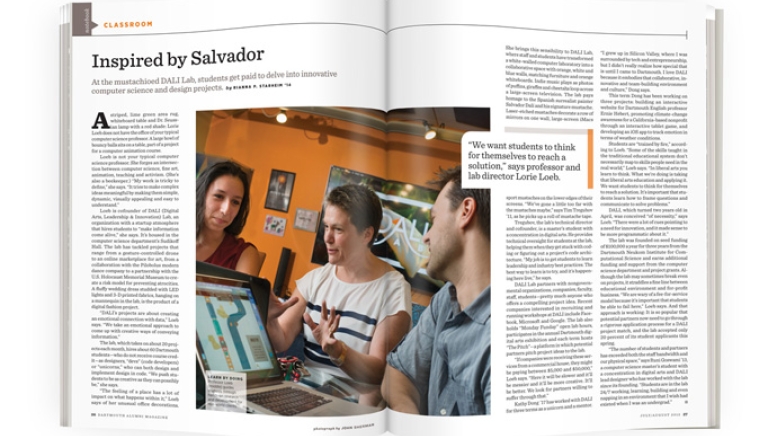A striped, lime green area rug, whiteboard table and Dr. Seuss-ian lamp with a red shade: Lorie Loeb does not have the office of your typical computer science professor. A large bowl of bouncy balls sits on a table, part of a project for a computer animation course.
Loeb is not your typical computer science professor. She forges an intersection between computer science, fine art, animation, teaching and activism. (She’s also a beekeeper.) “My work is tricky to define,” she says. “It tries to make complex ideas meaningful by making them simple, dynamic, visually appealing and easy to understand.”
Loeb is cofounder of DALI (Digital Arts, Leadership & Innovation) Lab, an organization with a startup atmosphere that hires students to “make information come alive,” she says. It’s housed in the computer science department’s Sudikoff Hall. The lab has tackled projects that range from a gesture-controlled drone to an online marketplace for art, from a collaboration with the Pilobolus modern dance company to a partnership with the U.S. Holocaust Memorial Museum to create a risk model for preventing atrocities. A fluffy wedding dress studded with LED lights and 3-D printed fabrics, hanging on a mannequin in the lab, is the product of a digital fashion project.
“DALI’s projects are about creating an emotional connection with data,” Loeb says. “We take an emotional approach to come up with creative ways of conveying information.”
The lab, which takes on about 20 projects each month, hires about 60 Dartmouth students—who do not receive course credit—as designers, “devs” (code developers) or “unicorns,” who can both design and implement design in code. “We push students to be as creative as they can possibly be,” she says.
“The feeling of a place has a lot of impact on what happens within it,” Loeb says of her unusual office decorations. She brings this sensibility to DALI Lab, where staff and students have transformed a white-walled computer laboratory into a collaborative space with orange, white and blue walls, matching furniture and orange whiteboards. Indie music plays as photos of puffins, giraffes and cheetahs loop across a large-screen television. The lab pays homage to the Spanish surrealist painter Salvador Dalí and his signature mustache. Laser-etched mustaches decorate a row of mirrors on one wall, large-screen iMacs sport mustaches on the lower edges of their screens. “We’ve gone a little too far with the mustaches maybe,” says Tim Tregubov ’11, as he picks up a roll of mustache tape.
Tregubov, the lab’s technical director and cofounder, is a master’s student with a concentration in digital arts. He provides technical oversight for students at the lab, helping them when they get stuck with coding or figuring out a project’s code architecture. “My job is to get students to learn leadership and industry best practices. The best way to learn is to try, and it’s happening here live,” he says.
DALI Lab partners with nongovernmental organizations, companies, faculty, staff, students—pretty much anyone who offers a compelling project idea. Recent companies interested in recruiting and running workshops at DALI include Facebook, Microsoft and Google. The lab also holds “Monday Funday” open lab hours, participates in the annual Dartmouth digital arts exhibition and each term hosts “The Pitch”—a platform in which potential partners pitch project ideas to the lab.
“If companies were receiving these services from a commercial house, they might be paying between $5,000 and $50,000,” Loeb says. “Here it will be slower and it’ll be messier and it’ll be more creative. It’ll be better. We look for partners willing to suffer through that.”
Kathy Dong ’17 has worked with DALI for three terms as a unicorn and a mentor. “I grew up in Silicon Valley, where I was surrounded by tech and entrepreneurship, but I didn’t really realize how special that is until I came to Dartmouth. I love DALI because it embodies that collaborative, innovative and team-building environment and culture,” Dong says.
This term Dong has been working on three projects: building an interactive website for Dartmouth English professor Ernie Hebert, promoting climate-change awareness for a California-based nonprofit through an interactive tablet game, and developing an iOS app to track emotion in terms of weather conditions.
Students are “trained by fire,” according to Loeb. “Some of the skills taught in the traditional educational system don’t necessarily map to skills people need in the real world,” Loeb says. “In liberal arts you learn to think. What we’re doing is taking that liberal arts education and applying it. We want students to think for themselves to reach a solution. It’s important that students learn how to frame questions and communicate to solve problems.”
DALI, which turned two years old in April, was conceived “of necessity,” says Loeb. “There were a lot of cues pointing to a need for innovation, and it made sense to be more programmatic about it.”
The lab was founded on seed funding of $100,000 a year for three years from the Dartmouth Neukom Institute for Computational Science and earns additional funding and support from the computer science department and project grants. Although the lab may sometimes break even on projects, it straddles a fine line between educational environment and for-profit business. “We are wary of a fee-for-service model because it’s important that students be able to fail here,” Loeb says. And that approach is working: It is so popular that potential partners now need to go through a rigorous application process for a DALI project match, and the lab accepted only 20 percent of its student applicants this spring.
“The number of students and partners has exceeded both the staff bandwidth and our physical space,” says Runi Goswami ’13, a computer science master’s student with a concentration in digital arts and DALI lead designer who has worked with the lab since its founding. “Students are in the lab 24/7 working, learning, building and even napping in an environment that I wish had existed when I was an undergrad.”




